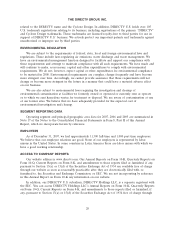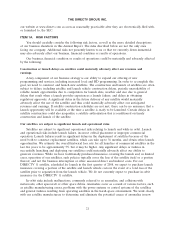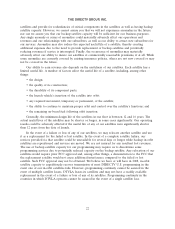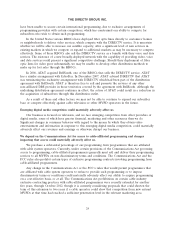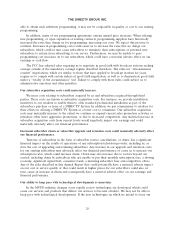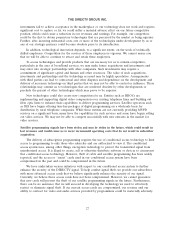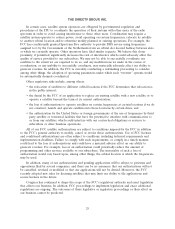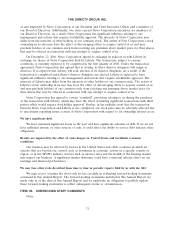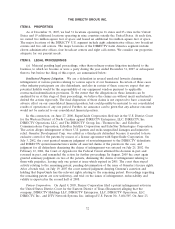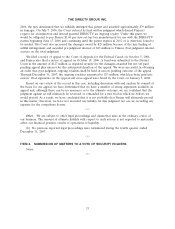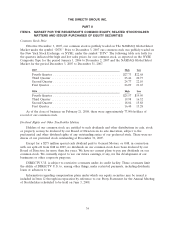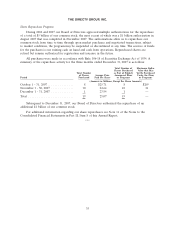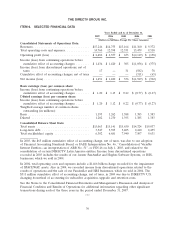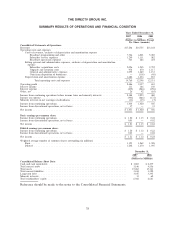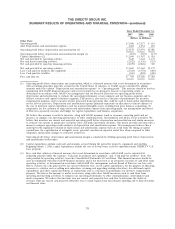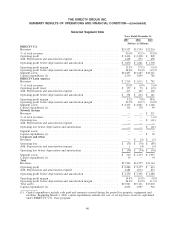DIRECTV 2007 Annual Report Download - page 39
Download and view the complete annual report
Please find page 39 of the 2007 DIRECTV annual report below. You can navigate through the pages in the report by either clicking on the pages listed below, or by using the keyword search tool below to find specific information within the annual report.THE DIRECTV GROUP, INC.
DTVLA is subject to various additional risks associated with doing business internationally, which
include political instability, economic instability, and foreign currency exchange rate volatility.
All of DTVLA’s operating companies are located outside the continental United States. DTVLA
operates and has subscribers located throughout Latin America and the Caribbean Basin, which makes
it vulnerable to risks of conducting business in foreign markets, including:
• difficulties and costs associated with complying with a wide variety of complex laws, treaties and
regulations;
• unexpected changes in regulatory environments;
• longer payment cycles;
• earnings and cash flows that may be subject to tax withholding requirements or the imposition of
tariffs, exchange controls or other restrictions;
• political and economic instability;
• import and export restrictions and other trade barriers;
• difficulties in maintaining overseas subsidiaries and international operations; and
• difficulties in obtaining approval for significant transactions.
In the past, the countries that constitute some of DTVLA’s largest markets, including Brazil,
Argentina, Colombia and Venezuela have experienced economic crises, caused by external and internal
factors, and characterized by exchange rate instability, high inflation, high domestic interest rates,
economic contraction, a reduction of international capital flows, a reduction of liquidity in the banking
sector and high unemployment. These economic conditions have often been related to political
instability, including political violence. If these economic conditions recur, they could substantially
reduce the purchasing power of the population in our markets and materially adversely affect our
business.
Because DTVLA offers premium pay television programming, its business is particularly vulnerable
to economic downturns. DTVLA has experienced, and may in the future experience, decreases or
instability in consumer demand for its programming, as well as subscriber credit problems. DTVLA’s
inability to adjust its business and operations to adequately address these issues could materially
adversely affect its revenues and ability to sustain profitable operations.
We may not be able to obtain or retain certain foreign regulatory approvals.
There can be no assurance that any current regulatory approvals held by us are, or will remain,
sufficient in the view of foreign regulatory authorities, or that any additional necessary approvals will be
granted on a timely basis or at all, in all jurisdictions in which we operate, or that applicable
restrictions in those jurisdictions will not be unduly burdensome. The failure to obtain the
authorizations necessary to operate satellites or provide satellite service internationally could have a
material adverse effect on our ability to generate revenue and our overall competitive position.
Our principal stockholder has significant influence over our management and over actions requiring
stockholder approval and its interests may differ from ours.
As of December 31, 2007, News Corporation held approximately 41% of the issued and
outstanding shares of our common stock. K. Rupert Murdoch, Chairman and Chief Executive of News
Corporation, is the Chairman of our Board of Directors, and Chase Carey, who was formerly a director
30


